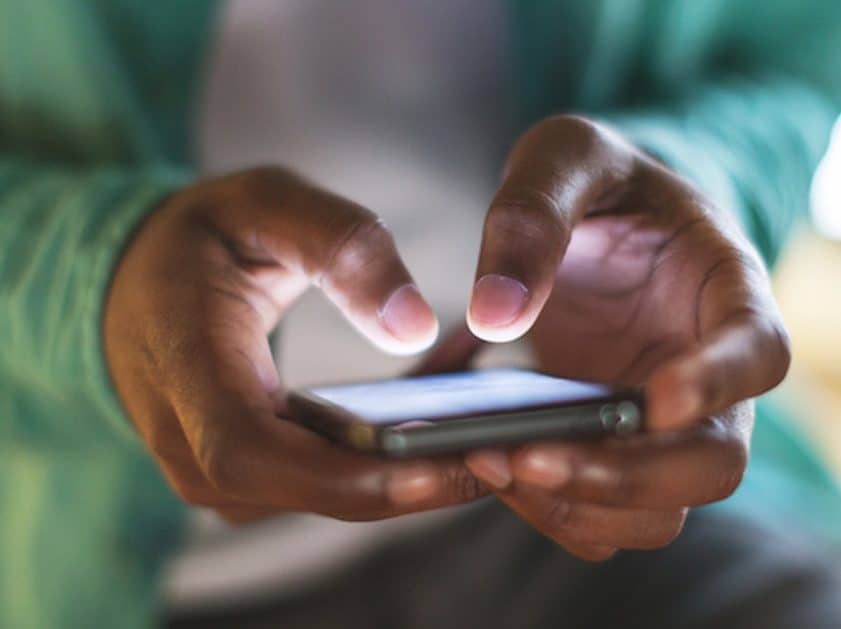- It’s hard to get closure when a relationship ends, even with the most amicable of breakups
- But when you’ve been frozen out of someone’s life for no apparent reason, it’s even more difficult to move on
- Here’s how to get over a romantic relationship if you’ve been ghosted

If you’ve been ghosted, you’ll know that it hurts like nothing else. Unlike being dumped, being ghosted offers no real closure, often making it difficult to move on. Unfortunately, ghosting’s only on the up: a 2018 survey of 18 to 34-year-olds found that 71% of male participants and 82% of female participants had been ghosted or had ghosted others at some point in their lives. Here’s how to get closure if you, like so many others, have fallen victim to ghosting.
Acknowledge that you’re allowed to be upset
Being ghosted is an extremely bewildering experience, so it’s not unusual to be left questioning your memories and feelings in the aftermath. If it appears as though your partner found it easy to vanish without so much as saying goodbye, you might be keen to play down how upset you are. If you look back at the relationship and all the happy memories you shared, you might start to feel as though you’re losing your grip on reality. But you most likely aren’t – the sudden change from seeing someone often to never hearing from them again would be enough to confuse anyone.


This is, admittedly, easier said than done. But it can help to ask yourself: am I really missing them, or am I missing the idea of them that I built up in my head? Depending on how long you were seeing your ghoster, it’s possible that you’re idealising them and longing for a version of them that only exists in your mind. After all – your ideal partner wouldn’t cut you out of their life with no explanation, would they?
Speaking to Health.com, Dr. Ruskin suggests that anyone struggling to cope with being ghosted focuses on the fact that while you can’t control someone else’s behaviour, you can control your reaction to it. Being ghosted can leave you feeling worthless, powerless, and disempowered – but realising that you can take ownership of your own behaviour is a surefire way to feel a little better.

Don’t let it impact your future relationships
The most important thing is to not let ghosting impact your future relationships. You might feel like stooping to your old partner’s level and ghosting someone yourself. You might feel scared to trust people and be unwilling to commit. You might resolve to never date anyone else ever, so as to completely eliminate your chances of getting ghosted again. But ultimately, this isn’t a healthy way to go about things.

Look back at your past relationship as objectively as possible and ask yourself if you missed any red flags. Perhaps you didn’t miss anything – ghosters are notoriously good at hiding their true colours – but maybe there were one or two signs that you were involved with someone emotionally immature. You can learn from the experience and have more agency in future relationships if you notice the telltale signs of a potential ghoster – refusal to discuss difficult feelings, getting intense after just a few dates, etc. – early on. Try and focus on the lessons you’ve learnt rather than the suffering you’ve gone through.
While you may, understandably, be anxious about trusting a new partner if you’ve been ghosted in the past, keep reminding yourself that you’re with a whole new person. Don’t project your fears onto them. “Don’t allow someone else’s bad behavior to rob you of a better future by losing your vulnerability and shutting yourself off from another relationship,” Dr. Vilhauer tells Psychology Today. “Know that if you are someone who treats people with respect and integrity then the ghoster simply wasn’t on your wavelength and someone better is coming your way, as long as you keep your heart open and your focus forward.”

If possible, communicate your anxieties to your new partner and explain your experience of being ghosted so they understand why you feel the way you feel. Because, as anyone who has been ghosted will know, communication is the single most important thing in a relationship.
As explained by Dr Jennice Vilhauer in Psychology Today, ghosting is a particularly painful betrayal given the ambiguity of the situation. “You don’t know how to react because you don’t really know what has happened,” she explains. “One of the most insidious aspects of ghosting is that it doesn’t just cause you to question the validity of the relationship you had, it causes you to question yourself.”
If you’ve been ghosted, one of the most important things you can do is simply allow yourself to be upset. Don’t try to repress your feelings – instead, acknowledge that you’ve had a really terrible thing happen to you, and permit yourself to be sad about it.

Don’t look for an ‘explanation’
If you’ve been ghosted, the question at the forefront of your mind is probably:why?
Your thoughts might race as you try to figure out what might have happened – maybe they lost their phone? Maybe they’re ill? Maybe they’re dead? But honestly, the reason most people ghost is simple: they’re emotionally immature.
“They don’t want to confront what it is that they’re feeling or they’re experiencing; it’s too hard for them,” Dr. Karen Ruskin, relationship and human behaviour expert, explains to Health.com. “Ghosting allows for an avoidance of conflicts, an avoidance of explanation and self-introspection,” she says.

An emotionally mature person would have sat you down and had a frank conversation with you if they wanted to end things. Think about it rationally – if you had lost your phone, wouldn’t you ping across a message on your laptop to let your partner know? If you were seriously ill, wouldn’t one of your friends let them know? And how often do healthy people suddenly become gravely ill, anyway?
There are very, very limited scenarios which excuse ghosting. It’s a hard pill to swallow, but things will get easier for you once you accept that there was nothing you could have done to prevent yourself being ghosted. The responsibility lies firmly with them.

Try and take comfort in the fact that you’ve dodged a bullet. As Dr. Ruskin points out: “if someone is going to ghost, it’s better that you know now. Better now than two weeks later or a month later or a year later.”
Let them go
Once you’ve accepted that there was really nothing you could have done to prevent this from happening to you, let your partner go. Don’t hold out hope that they’ll reply with some totally understandable explanation.

This is, admittedly, easier said than done. But it can help to ask yourself: am I really missing them, or am I missing the idea of them that I built up in my head? Depending on how long you were seeing your ghoster, it’s possible that you’re idealising them and longing for a version of them that only exists in your mind. After all – your ideal partner wouldn’t cut you out of their life with no explanation, would they?
Speaking to Health.com, Dr. Ruskin suggests that anyone struggling to cope with being ghosted focuses on the fact that while you can’t control someone else’s behaviour, you can control your reaction to it. Being ghosted can leave you feeling worthless, powerless, and disempowered – but realising that you can take ownership of your own behaviour is a surefire way to feel a little better.

Don’t let it impact your future relationships
The most important thing is to not let ghosting impact your future relationships. You might feel like stooping to your old partner’s level and ghosting someone yourself. You might feel scared to trust people and be unwilling to commit. You might resolve to never date anyone else ever, so as to completely eliminate your chances of getting ghosted again. But ultimately, this isn’t a healthy way to go about things.

Look back at your past relationship as objectively as possible and ask yourself if you missed any red flags. Perhaps you didn’t miss anything – ghosters are notoriously good at hiding their true colours – but maybe there were one or two signs that you were involved with someone emotionally immature. You can learn from the experience and have more agency in future relationships if you notice the telltale signs of a potential ghoster – refusal to discuss difficult feelings, getting intense after just a few dates, etc. – early on. Try and focus on the lessons you’ve learnt rather than the suffering you’ve gone through.
While you may, understandably, be anxious about trusting a new partner if you’ve been ghosted in the past, keep reminding yourself that you’re with a whole new person. Don’t project your fears onto them. “Don’t allow someone else’s bad behavior to rob you of a better future by losing your vulnerability and shutting yourself off from another relationship,” Dr. Vilhauer tells Psychology Today. “Know that if you are someone who treats people with respect and integrity then the ghoster simply wasn’t on your wavelength and someone better is coming your way, as long as you keep your heart open and your focus forward.”

If possible, communicate your anxieties to your new partner and explain your experience of being ghosted so they understand why you feel the way you feel. Because, as anyone who has been ghosted will know, communication is the single most important thing in a relationship.

